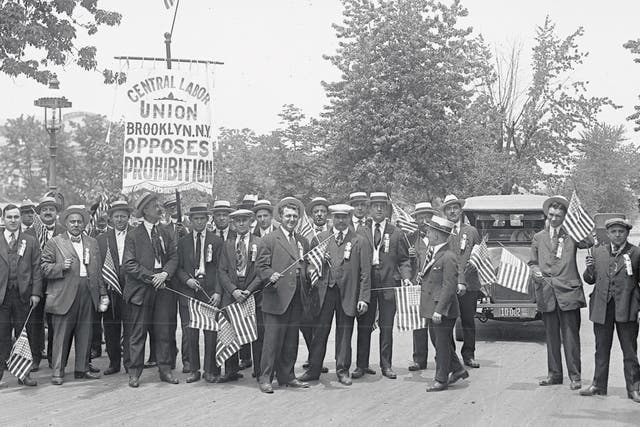 Brooklyn delegation in Washington, D.C. at "wet" parade." width="" height="" />
Brooklyn delegation in Washington, D.C. at "wet" parade." width="" height="" /> Brooklyn delegation in Washington, D.C. at "wet" parade." width="" height="" />
Brooklyn delegation in Washington, D.C. at "wet" parade." width="" height="" />
By the late 1800s, prohibition movements had sprung up across the United States, driven by religious groups who considered alcohol, specifically drunkenness, a threat to the nation. The movement reached its apex in 1919 with the ratification of the 18th Amendment, prohibiting the manufacture, transportation and sale of intoxicating liquors. Prohibition proved difficult to enforce and failed to have the intended effect of eliminating crime and other social problems–to the contrary, it led to a rise in organized crime, as the bootlegging of alcohol became an ever-more lucrative operation. In 1933, widespread public disillusionment led Congress to ratify the 21st Amendment, which repealed Prohibition.
A wave of intense religious revivalism that swept the U.S. during the 1820s and 30s led to the formation of a number of prohibition movements driven by religious groups who considered alcohol, specifically drunkenness, a “national curse.” (This revivalism also helped inspire the movement to end slavery.) The first temperance legislation appeared in 1838, in the form of a Massachusetts law prohibiting the sale of spirits in less than 15-gallon quantities. Though it was repealed two years later, Maine passed the first state prohibition law in 1846, and by the time the Civil War began, a number of other states had followed suit.
During the 13 dry years of Prohibition, sneaky Americans went to great lengths to conceal their alcohol consumption from law enforcement.
The 13‑year ban on beer production during Prohibition forced America’s biggest brewers to find creative ways to remain in business.
Carry Nation had a bad history with alcohol—and she went to extremes to try and get it banned.